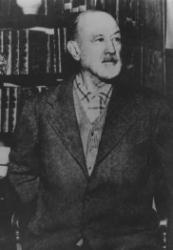- |
User Links
Charles E. Ives

www.wikipedia.org
| Short Name: | Charles E. Ives |
| Full Name: | Ives, Charles, 1874-1954 |
| Birth Year: | 1874 |
| Death Year: | 1954 |
Charles Ives
Born: 1874, Died: 1954
Born in Danbury, Connecticut on 20 October 1874, Charles Ives pursued what is perhaps one of the most extraordinary and paradoxical careers in American music history. Businessman by day and composer by night, Ives's vast output has gradually brought him recognition as the most original and significant American composer of the late 19th and early 20th centuries. Inspired by transcendentalist philosophy, Ives sought a highly personalized musical expression through the most innovative and radical technical means possible. A fascination with bi-tonal forms, polyrhythms, and quotation was nurtured by his father who Ives would later acknowledge as the primary creative influence on his musical style. Studies at Yale with Horatio Parker guided an expert control overlarge-scale forms.
Ironically, much of Ives's work would not be heard until his virtual retirement from music and business in 1930 due to severe health problems. The conductor Nicolas Slonimsky, music critic Henry Bellamann, pianist John Kirkpatrick (who performed the Concord Sonata at its triumphant premiere in New York in 1939), and the composer Lou Harrison (who conducted the premiere of the Symphony No. 3) played a key role in introducing Ives's music to a wider audience. Henry Cowell was perhaps the most significant figure in fostering public and critical attention for Ives's music, publishing several of the composer's works in his New Music Quarterly.
In 1947, Ives was awarded the Pulitzer Prize for his Symphony No. 3, according him a much deserved modicum of international renown. Soon after, his works were taken up and championed by such leading conductors as Leonard Bernstein and, at his death in 1954, he had witnessed a rise from obscurity to a position of unsurpassed eminence among the world's leading performers and musical institutions.
--www.schirmer.com
| Tunes by Charles E. Ives (2) | As | Instances | Incipit |
|---|---|---|---|
| ELLIOTT (Ives) | C. E. Ives (Composer) | 1 | 55617 65516 21671 |
| SERENITY (Ives) | Charles E. Ives (Composer) | 3 |


 My Starred Hymns
My Starred Hymns


